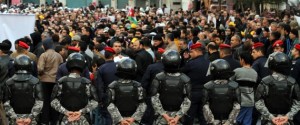What Is The State Of Political Islam Today?
< < Go Back
By Nick Robins-Early with Shadi Hamid,
Democracy is nice in theory, but it’s a little more difficult to swallow for many different Arab constituencies in practice.
The fall of dictatorships across the Middle East and North Africa during the Arab Spring protests in 2011 paved the way for Islamist parties to join governments across the Middle East and North Africa. After decades of repression by authoritarian governments, political Islam was able to significantly expand in countries like Tunisia, Egypt and Morocco.
In many places, however, the Islamist parties’ rise was short lived. In Egypt, the rule of Islamist President Mohammed Morsi was followed by a ruthless crackdown on the Muslim Brotherhood. In Tunisia, the Islamist Ennahda party lost the most recent elections.
Support for Islamist parties has not completely disappeared, however, even as the Brotherhood has been outlawed and other parties lost power.
The WorldPost spoke with Dr. Shadi Hamid about the state of political Islam today. Hamid is a Brookings Institute Fellow and the author of Temptations of Power, a book on Islamist movements.
In the wake of the so called Arab Spring protests, Islamist parties swept to power in several countries in the Middle East and North Africa. Now, with a few exceptions, that power has dissipated. What happened to those parties?
At the most basic level, Islamist parties were simply unprepared for the Arab Spring and what came with it. We have to remember that this really did come as a surprise to the actors themselves, who weren’t really planning for anything resembling revolution. It was impossible to imagine that scenario.
For Islamists in particular, it brought to the fore a lot of challenging and unanswered questions about the tension between absolute religious ideas and the mundane realities of everyday politics. Islamists have to appeal to different audiences, and it’s a very delicate balance because these different constituencies want very different things. Democracy is nice in theory, but it’s a little more difficult to swallow for many different Arab constituencies in practice.
More broadly, there’s also a foundational divide in the Middle East over religion and the meaning and nature of the nation-state. That divide is difficult to resolve.
Is that foundational divide based on different conceptions of the nation-state or does it have it more to do with concepts of identity?
The two are intertwined. Mainstream Islamists have largely reconciled themselves to the Westphalian order. You can be okay with the nation-state but disagree on what the purpose of the nation-state is. Should the state be ideologically or religiously neutral or should it be entrusted with promoting a certain conception of the Good? Even in a country that has had decades of democratic experience like Turkey, that is a debate that is really returning to the fore.
Turkey is one of the countries where Islamists are in power. There’s been concern over the country’s perceived movement towards illiberal democracy.
Turkey is fascinating in this regard because we do see a very noticeable shift. The ruling AKP party of 2004 is not the AKP party of today and we have to ask what happened in between. Part of this is that the AKP party was very constrained when they came to power. They were worried about a military coup and therefore were very careful about how they talked about religion and avoided crossing certain red lines.
I think it’s important to think that Islamists are Islamists for a reason., and to expect them to disavow the entirety of who they are is unrealistic and doesn’t make sense from a pure electoral standpoint. Many people like Islamists precisely because they’re Islamists.
How is political Islam today grappling with the dilemma of literalist interpretations of Islam conflicting with concerns of the state?
I think the subtext in so many debates over the past few months about ISIS or Charlie Hebdo is that there’s a kind of impatience, anger and frustration with Muslims for not getting on board with liberal democracy.
In a lot of these debates, people are asking Muslims to come to terms with liberal democracy and go through a reformation. I think for a variety of reasons there has to be a kind of understanding that there may be peoples or societies that aren’t comfortable working within the confines of liberal democracy, and want to try out a new ideological project. There has to be a realistic understanding that there’s going to be a type of religious illiberalism in that move towards democracy in the region.
The question is — and this is a difficult one for Western liberals — should Egyptians, Jordanians or whoever else be able to decide through the democratic process that they want to try out a different approach to religion, law and governance?
More From The Huffington Post:




